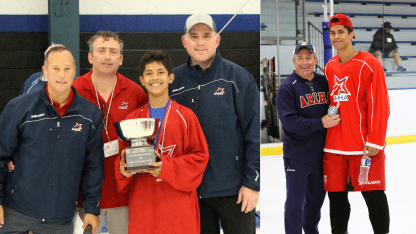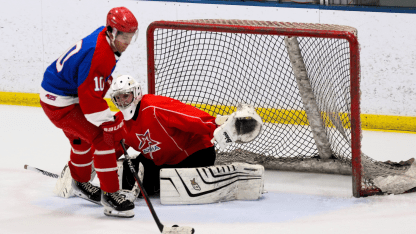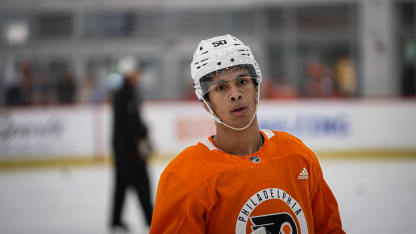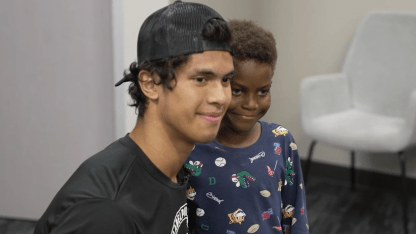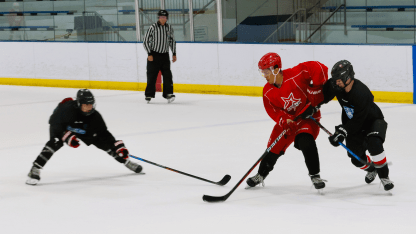Powell no longer wears hearing aids when he's on the ice, instead relying on his ability to read lips and willingness to speak up as needed.
"It's advocating for yourself," he said, "telling your teammates, making sure they know, the coaching staff, the training staff, and then kind of putting yourself in situations where you can make sure you're getting the most out of what people are saying and always making sure you're facing whoever's talking to you."
It's why Powell's coaches and trainers now don't always notice his hearing impairment.
"I knew about [the hearing loss] but it's never been an issue on the ice with him," said former NHL player Ben Eager, who has trained Powell during the offseason for about seven years at his Jet Hockey Training Arena in Glenview, Illinois. "I know he's dealt with it; I know he reads lips, but I've really never had to think about it too much. I know it's definitely an issue for him, but it's never really held him back."
But his production on the ice did hold him back. He had 19 points (eight goals, 11 assists) in 53 games in 2022-23, his first season with Dubuque of the United States Hockey League, and was passed over in all seven rounds of the 2023 NHL Draft.
Powell's struggles continued into last season, whean he scored one goal for Dubuque in his first 16 games.
"His whole time with us in Dubuque, we all felt like he had another gear in terms of actually executing in games," team assistant coach Evan Dixon said. "... He was great in training camp, he's a really strong kid. Really good through the preseason, then the first couple games in the year was a little rocky.
"Took us all a second to regroup and kind of really not define, but get him headed on the right path. For him, that was largely directed toward his strengths as a player. He's really strong, he can protect pucks well, he's got a hard shot. For us it was just being consistent with the message of how he can get into areas to be a scoring threat offensively.
"We had some conversations with him and video sessions with him that were always geared toward that. I won't say one particular meeting clicked, but there was a moment that he bought into it fully and started to see results in a big way."
After that slow start last season, Powell scored 42 goals in his final 45 games, and finished with a USHL-leading 43 goals in 61 games.
The Flyers were among the teams that took notice, and selected Powell (6-foot-1, 201 pounds) in the fifth round (No. 148) of the 2024 NHL Draft.
"You can see how he can score goals in juniors, just because of his strength on the puck, his ability to shoot the puck, his willingness to go to the hard areas and get his nose in there," Flyers assistant general manager Brent Flahr said. "A real determined kid. He's just one of those kids that the puck just follows. Whether it's hockey sense or whatever it is, the puck follows him and he gets his looks at the net and he's willing to pay a price and get his nose in there to score goals."
Powell will continue his development this fall as a freshman at Ohio State, while also being a role model for hearing-impaired youth hockey players. During a busy offseason that included Flyers development camp, the 2024 World Junior Summer Showcase and preparing for college, he skated at an AHIHA camp, and met with 7-year-old Howard James, a hearing-impaired player in the Snider Hockey program.
